The Xeon Entry Quad-Core CPU Review: Xeon E-2174G, E-2134, and E-2104G Tested
by Ian Cutress on March 11, 2019 10:30 AM EST- Posted in
- CPUs
- Xeon
- Enterprise CPUs
- Coffee Lake
- Xeon E
- C246
Gaming: Ashes Classic (DX12)
Seen as the holy child of DirectX12, Ashes of the Singularity (AoTS, or just Ashes) has been the first title to actively go explore as many of the DirectX12 features as it possibly can. Stardock, the developer behind the Nitrous engine which powers the game, has ensured that the real-time strategy title takes advantage of multiple cores and multiple graphics cards, in as many configurations as possible.
As a real-time strategy title, Ashes is all about responsiveness during both wide open shots but also concentrated battles. With DirectX12 at the helm, the ability to implement more draw calls per second allows the engine to work with substantial unit depth and effects that other RTS titles had to rely on combined draw calls to achieve, making some combined unit structures ultimately very rigid.
Stardock clearly understand the importance of an in-game benchmark, ensuring that such a tool was available and capable from day one, especially with all the additional DX12 features used and being able to characterize how they affected the title for the developer was important. The in-game benchmark performs a four minute fixed seed battle environment with a variety of shots, and outputs a vast amount of data to analyze.
For our benchmark, we run Ashes Classic: an older version of the game before the Escalation update. The reason for this is that this is easier to automate, without a splash screen, but still has a strong visual fidelity to test.
Ashes has dropdown options for MSAA, Light Quality, Object Quality, Shading Samples, Shadow Quality, Textures, and separate options for the terrain. There are several presents, from Very Low to Extreme: we run our benchmarks at the above settings, and take the frame-time output for our average and percentile numbers.
| AnandTech CPU Gaming 2019 Game List | ||||||||
| Game | Genre | Release Date | API | IGP | Low | Med | High | |
| Ashes: Classic | RTS | Mar 2016 |
DX12 | 720p Standard |
1080p Standard |
1440p Standard |
4K Standard |
|
All of our benchmark results can also be found in our benchmark engine, Bench.
| AnandTech | IGP | Low | Medium | High |
| Average FPS |
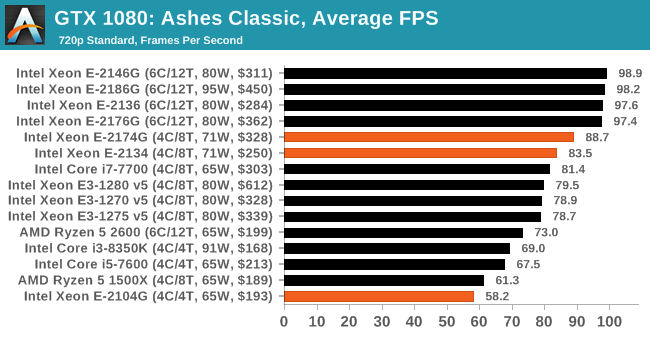
|
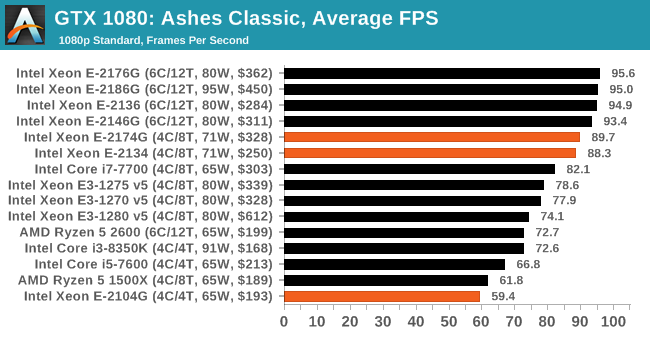
|
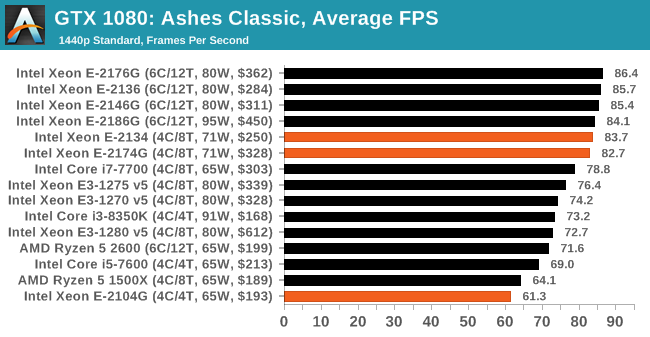
|
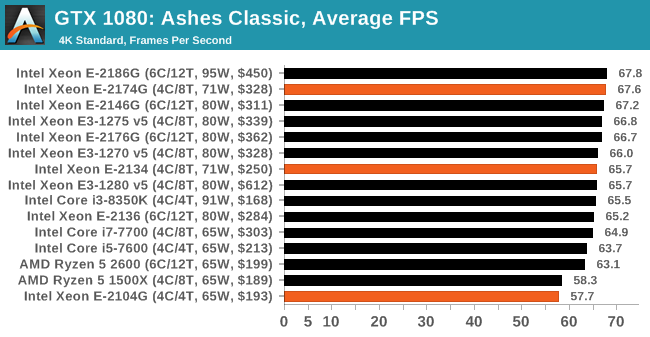
|
| 95th Percentile |
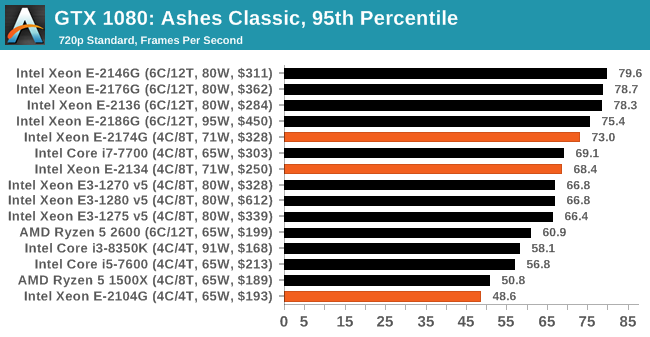
|
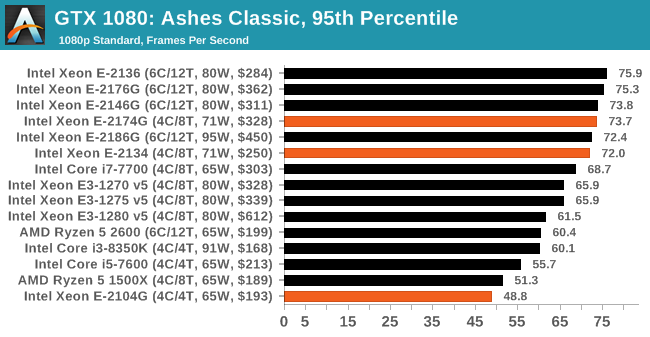
|
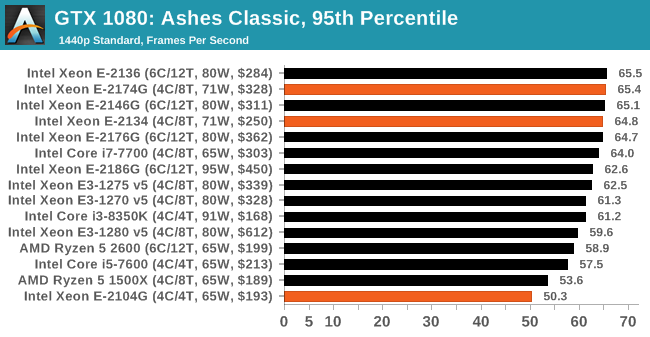
|
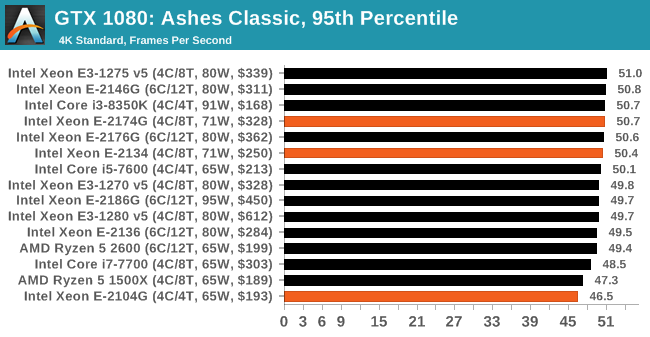
|


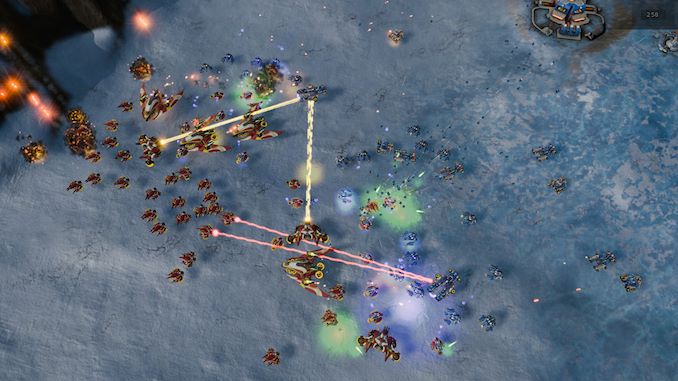









29 Comments
View All Comments
dgingeri - Monday, March 11, 2019 - link
It would be interesting to get comparative data on the 2124G and the 2126G to see if 4/8 or 6/6 would perform better.dgingeri - Monday, March 11, 2019 - link
er, sorry, meant the 2144G, not the 2124G.Stuka87 - Wednesday, March 13, 2019 - link
In my experience, real cores perform better than hyper-threaded cores. So I would be on the 6/6.yankeeDDL - Monday, March 11, 2019 - link
Is it me of the $328 xeon often loses (and sometimes by a sizable margin) to the $199 Ryzen 2600?RSAUser - Monday, March 11, 2019 - link
Definitely, but here the power envelope is important for the test, which Anandtech doesn't seem to give. It's quite worrisome how most of those Xeons are operating outside of their power envelope, that E-2174G that you are referring to is pulling 85W for a rated 71W, so Intel gives a P2 power limit. Why bother with the normal TDP then? The 2600 seems to be owning price/performance and TDP/performance. Question there is EEC memory support, and the guarantee/testing including with Xeons. That's why I mentioned including TR in the benchmarks, or at least the 2700X.This is going to be interesting when AMD releases their 7nm products.
SaturnusDK - Monday, March 11, 2019 - link
All AMD CPUs based on Zen or Zen+ supports EEC RAM. It's up to the MB manufacturer if they have included the support on their MBs. For any workstation build where you don't need the memory bandwidth or superior number of PCIe lanes the TR series offer, you'd use the Ryzen Pro series, not the consumer desktop series.mode_13h - Monday, March 11, 2019 - link
I seem to recall reading that at least some of the Zen-based APUs are lacking ECC-support. I'd love to be proven wrong...notashill - Tuesday, March 12, 2019 - link
AMD has directly confirmed that all Raven Ridge APUs support ECC.https://forums.anandtech.com/threads/amd-ama-start...
Yorgos - Sunday, March 17, 2019 - link
You seem to know nothing.ondma - Monday, March 11, 2019 - link
The 2600 goes over its TDP as well. It actually goes over its TDP by 20%, pretty much the same percentage as the hex core Intel cpus. And as usual, Anand is using an antiquated dgpu for the gaming tests.